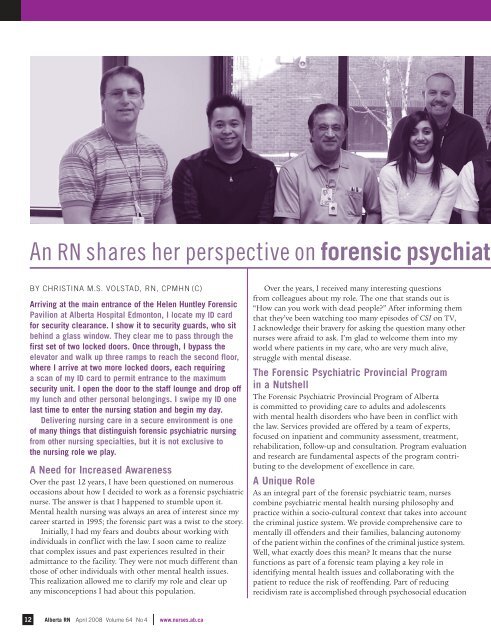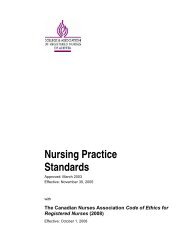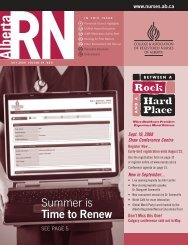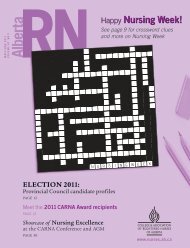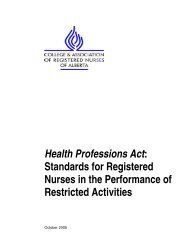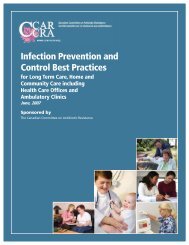I am a nurse. - College & Association of Registered Nurses of Alberta
I am a nurse. - College & Association of Registered Nurses of Alberta
I am a nurse. - College & Association of Registered Nurses of Alberta
You also want an ePaper? Increase the reach of your titles
YUMPU automatically turns print PDFs into web optimized ePapers that Google loves.
12<br />
An RN shares her perspective on forensic psychiat<br />
BY CHRISTINA M.S. VOLSTAD, RN, CPMHN (C)<br />
Arriving at the main entrance <strong>of</strong> the Helen Huntley Forensic<br />
Pavilion at <strong>Alberta</strong> Hospital Edmonton, I locate my ID card<br />
for security clearance. I show it to security guards, who sit<br />
behind a glass window. They clear me to pass through the<br />
first set <strong>of</strong> two locked doors. Once through, I bypass the<br />
elevator and walk up three r<strong>am</strong>ps to reach the second floor,<br />
where I arrive at two more locked doors, each requiring<br />
a scan <strong>of</strong> my ID card to permit entrance to the maximum<br />
security unit. I open the door to the staff lounge and drop <strong>of</strong>f<br />
my lunch and other personal belongings. I swipe my ID one<br />
last time to enter the nursing station and begin my day.<br />
Delivering nursing care in a secure environment is one<br />
<strong>of</strong> many things that distinguish forensic psychiatric nursing<br />
from other nursing specialties, but it is not exclusive to<br />
the nursing role we play.<br />
A Need for Increased Awareness<br />
Over the past 12 years, I have been questioned on numerous<br />
occasions about how I decided to work as a forensic psychiatric<br />
<strong>nurse</strong>. The answer is that I happened to stumble upon it.<br />
Mental health nursing was always an area <strong>of</strong> interest since my<br />
career started in 1995; the forensic part was a twist to the story.<br />
Initially, I had my fears and doubts about working with<br />
individuals in conflict with the law. I soon c<strong>am</strong>e to realize<br />
that complex issues and past experiences resulted in their<br />
admittance to the facility. They were not much different than<br />
those <strong>of</strong> other individuals with other mental health issues.<br />
This realization allowed me to clarify my role and clear up<br />
any misconceptions I had about this population.<br />
<strong>Alberta</strong> RN April 2008 Volume 64 No 4 www.<strong>nurse</strong>s.ab.ca<br />
Over the years, I received many interesting questions<br />
from colleagues about my role. The one that stands out is<br />
“How can you work with dead people?” After informing them<br />
that they’ve been watching too many episodes <strong>of</strong> CSI on TV,<br />
I acknowledge their bravery for asking the question many other<br />
<strong>nurse</strong>s were afraid to ask. I’m glad to welcome them into my<br />
world where patients in my care, who are very much alive,<br />
struggle with mental disease.<br />
The Forensic Psychiatric Provincial Progr<strong>am</strong><br />
in a Nutshell<br />
The Forensic Psychiatric Provincial Progr<strong>am</strong> <strong>of</strong> <strong>Alberta</strong><br />
is committed to providing care to adults and adolescents<br />
with mental health disorders who have been in conflict with<br />
the law. Services provided are <strong>of</strong>fered by a te<strong>am</strong> <strong>of</strong> experts,<br />
focused on inpatient and community assessment, treatment,<br />
rehabilitation, follow-up and consultation. Progr<strong>am</strong> evaluation<br />
and research are fund<strong>am</strong>ental aspects <strong>of</strong> the progr<strong>am</strong> contributing<br />
to the development <strong>of</strong> excellence in care.<br />
A Unique Role<br />
As an integral part <strong>of</strong> the forensic psychiatric te<strong>am</strong>, <strong>nurse</strong>s<br />
combine psychiatric mental health nursing philosophy and<br />
practice within a socio-cultural context that takes into account<br />
the criminal justice system. We provide comprehensive care to<br />
mentally ill <strong>of</strong>fenders and their f<strong>am</strong>ilies, balancing autonomy<br />
<strong>of</strong> the patient within the confines <strong>of</strong> the criminal justice system.<br />
Well, what exactly does this mean? It means that the <strong>nurse</strong><br />
functions as part <strong>of</strong> a forensic te<strong>am</strong> playing a key role in<br />
identifying mental health issues and collaborating with the<br />
patient to reduce the risk <strong>of</strong> re<strong>of</strong>fending. Part <strong>of</strong> reducing<br />
recidivism rate is accomplished through psychosocial education


